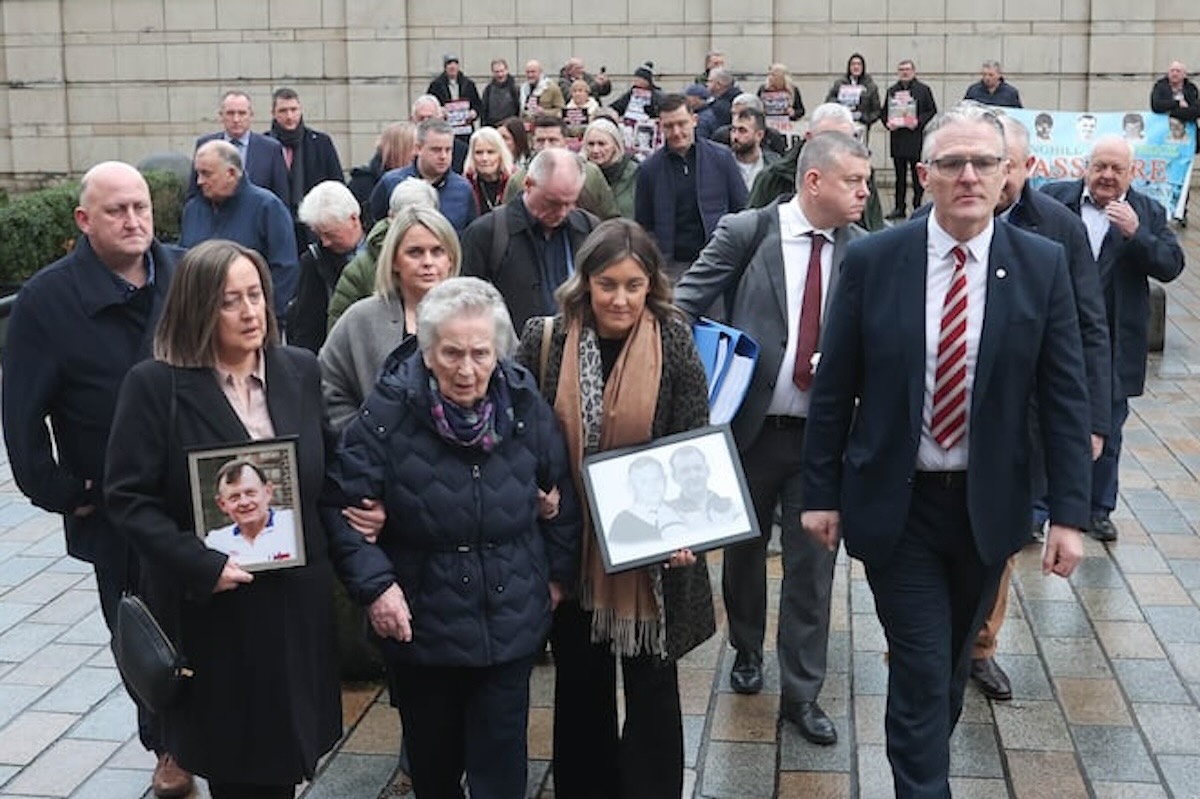
The family of GAA sports official Sean Brown are taking a legal action against the British government for refusing to hold a public inquiry into his murder.
Joined by families of British atrocities including the Ballymurphy massacre and the McGurk’s bar bombing, as well as GAA President Jarlath Burns, Mr Brown’s widow Bridie marched to Belfast High Court on Thursday morning to continued the fight for a public inquiry into his death with a judicial review.
Mr Brown died in May 1997 after he was attacked and beaten by a unionist murder gang as he locked the gates at Bellaghy Wolfe Tones Gaelic sports club in County Derry. Placed in the boot of his own car, he was then taken to a country lane where he was shot six times.
Earlier this year, an inquest collapsed after the coroner said the PSNI police and British military intelligence had failed to disclose vital information relating to allegations of state collusion in the murder.
A request to the British government from the coroner, Patrick Kinney, for a public inquiry was also rejected in September.
Issues raised in the inquest included that more than 25 people had been linked by intelligence to the murder, including several state agents.
Speaking to journalists outside Belfast High Court, Sinn Féin MP John Finucane said there was “overwhelming support” for the Brown family, and that only a full public inquiry had the capacity to deliver the truth.
He also said more was needed from the Labour government to reverse the “toxic” effect of the legacy act.
“We need to see more than just civil cases reopening. The immunity provisions were always disapplied as soon as our courts had made their determination on it, so we need to see this moving forward in a way that has families and victims front and centre at the heart of the process,” he said.
Mark Thompson from the Relatives for Justice campaign group, said: “The coroner has already ruled on this, this needs a public inquiry. Why are we back in this court, why has this family been dragged back here so many times?
He added: “It’s harm on top of harm, it’s torture for the families. We could get on and get this done, but the reality at the bottom line in all of this is that the British state don’t want the truth coming out about collusion, about its role and tactics in this conflict.”
Representing the Ballymurphy families was John Teggart, whose father Daniel was one of 10 people shot dead by British soldiers in 1971.
“We stand in solidarity with the Brown family. Hopefully by the end of this two-day hearing we’ll get the conclusion that they should get a public inquiry into the murder of their loved one,” he said.
He noted that the British state continues to hold back key documents to block the route to justice in many collusion cases.
“It’s all about the truth, and the truth lies in the disclosure about what the state are hiding for all these years.”
In an affidavit read out in court, Mrs Brown described going to the Gaelic club grounds with a torchlight to search in vain for her husband on the night he failed to return home.
She also recalled police officers attending the family’s house hours later, and her shock when one of them asked why her daughter was crying.
“Bridie Brown’s experience on that morning after her husband’s murder are emblematic of how she and the Brown family have been treated by all of the state parties in the intervening 27 years,” Mr Fahy submitted.
The barrister accepted that the chances of anyone ever being convicted for the killing are “vanishingly small”.
In the absence of other possible solutions, he said there is currently no plausible or lawful alternative way in which the government can discharge its legal responsibilities.
The court heard revelations that state agents were connected to the killing came as a “shock of seismic proportions” to the family.
Despite the collapse of the inquest, counsel described the legal challenge as another opportunity to obtain the correct account of what happened.
Mr Fahy indicated that it was pointless for the British Direct Ruler to keep “beating the drum” for his client to refer herself to the new official truth body, the ‘Independent Commission for Reconciliation and Information Recovery’ (ICRIR).
“She has told him to his face in a meeting in August that the Brown family will never engage with the ICRIR,” the barrister confirmed.
Likening the situation to that which led to the public inquiry into alleged Russian state involvement in the 2006 murder of ex-spy Alexander Litvinenko in London, he suggested equivalent central issues feature in the GAA man’s killing.
“That is the involvement of...loyalist paramilitaries who were also UK state agents, and the possibility they were shielded from investigation after the kidnap and murder,” he explained.
Mr Fahy also stressed it was a unique case which must be assessed on its own merits. The case continues.
![[Irish Republican News]](https://republican-news.org/graphics/title_gifs/rn.gif)
![[Irish Republican News]](https://republican-news.org/graphics/title_gifs/harp.gif)

